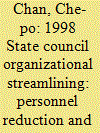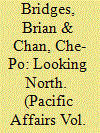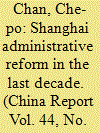| Srl | Item |
| 1 |
ID:
020482


|
|
|
|
|
| Publication |
Nov 2001.
|
| Description |
553-572
|
| Summary/Abstract |
The two goals of the 1998 State Council organizational streamlining were personnel reduction and a change of government functions. It is argued that the methods being used to achieve personnel reduction do not constitute a real reduction but largely involve transferring staff to other public institutions. Real personnel reduction could not be achieved without a major change of government function. Institutional reforms of both the central and local governments since the 1980s have been adaptations to the changing economic structure from a planned to a market economy. Government functions have served both existing economies. Cadres cannot be reduced unless the government function of direct management of state-enterprises is completely severed. The major contents of the 1998 institutional reform are examined and evaluated. The prospects for the success of the reform are also assessed
|
|
|
|
|
|
|
|
|
|
|
|
|
|
|
|
| 2 |
ID:
070707


|
|
|
|
|
| Publication |
2006.
|
| Summary/Abstract |
The anti-Japanese demonstrations in China in April 2005 and the Japanese reactions have been characterized as a "clash of nationalisms." This article examines in detail the nature of contemporary nationalism in both China and Japan, taking a number of current issues in the bilateral relationship as case studies. It differentiates between state and popular nationalism and between assertive and reactive nationalism. Focusing primarily on popular nationalism, the authors contend that in both China and Japan, contrary to perceptions within each country that the other country is practicing assertive nationalism, in fact reactive nationalism better encapsulates the type of nationalism that is occurring.
|
|
|
|
|
|
|
|
|
|
|
|
|
|
|
|
| 3 |
ID:
110076


|
|
|
|
|
| Publication |
2012.
|
| Summary/Abstract |
Why do large domestic and multinational enterprises choose one Chinese city over the others in which to set up their company headquarters? What could the Chinese local governments do in order to attract enterprises to establish headquarters in their localities? Following the Chinese commonly used term 'headquarter economy' and investigating the issue mostly from the local governments' perspective, this research examines two cases, Pudong and Shenzhen, to see how they have capitalized on their local advantages and attracted different types of large investments. Both the Pudong and Shenzhen governments provide preferential policies and administrative reforms to build a good investment environment and to develop a 'headquarter economy'. Their preferential policies are similar in design but different in content, so as to attract different target investors. Their administrative reforms are similar in direction but with variations in pace and design for implementation. Our conclusion shows that 'headquarter economy' is a concept flexibly used and wisely adopted by Chinese local governments to develop local economies.
|
|
|
|
|
|
|
|
|
|
|
|
|
|
|
|
| 4 |
ID:
169959


|
|
|
|
|
| Summary/Abstract |
A widely-held perception is that the image of North Korea among most Chinese people has changed from that of a socialist comrade and ‘little brother’ to an idiosyncratic, trouble-making neighbor. This research questions the homogeneity of Chinese people’s viewpoints towards North Korea. Concepts of state and popular nationalism are used to examine differences and similarities between the Chinese state and its people in their perceptions and sentiments towards North Korea, mainly focusing on the period of succession from Kim Jong-il to Kim Jong-un. Examining online discussions representing Chinese popular nationalism demonstrated that Chinese netizens’ political viewpoints are diversified along the ideological spectrum of left and right and that only the ‘moderate left’ netizens hold an image of North Korea which is close to that of their political authorities.
|
|
|
|
|
|
|
|
|
|
|
|
|
|
|
|
| 5 |
ID:
157293


|
|
|
|
|
| Summary/Abstract |
Why are Chinese university graduates, who in the past avoided socio-economically backward rural areas, willing to start their careers in such areas today? This research argues that the Chinese authorities have promoted “grassroots employment” for university graduates through preferential policies together with the values of “socialist citizenship”. However, the preferential policies actually reflect a different value of “instrumental utilitarianism” which resonates well with the dominant youth culture. This article examines the promotional strategies of four “grassroots employment” programmes in order to determine whether the popularity of the four programmes is due to the success of “socialist citizenship” or to the preferential policies. The benefits, difficulties and prospects of achieving the objectives of these “grassroots employment” programmes are briefly evaluated. The main conclusions are that the authorities have used “socialist citizenship” as a camouflage and that the preferential policies have accentuated youths’ enthusiasm to join the programmes.
|
|
|
|
|
|
|
|
|
|
|
|
|
|
|
|
| 6 |
ID:
072866


|
|
|
|
|
| Publication |
2006.
|
| Summary/Abstract |
While the Chinese local adminstrative reforms so far have aimed at adapting to a market economy, in Pudong administrative reform has focused on setting up a local government that conforms to WTO rules and managing a market economy that integrates domestic and foreign investments. This article evaluates the results of the Pudong administrative reform and argues that the reform was part of building up an infrastructure conducive to investments. The reform obviously achieved the objective of attracting large capital investments, but there is still much room for improvement in the setting up of a fair economic market for all competitors.
|
|
|
|
|
|
|
|
|
|
|
|
|
|
|
|
| 7 |
ID:
085884


|
|
|
|
|
| Publication |
2009.
|
| Summary/Abstract |
On the 5th January 2007 the first high-express trains began to run between Taiwan's largest two cities, Taipei and Kaohsiung, Modelled on Japan's highly successful shinkansen (bullet trains), these trains were not just a significant export success for Japanese manufactures, but also symbolized th extent to which Taiwan's relationship wuth Japan has been quietly but steadily developing.
|
|
|
|
|
|
|
|
|
|
|
|
|
|
|
|
| 8 |
ID:
090282


|
|
|
|
|
| Publication |
2008.
|
| Summary/Abstract |
Since the last decade, the Shanghai government has carried out administrative reforms towards the goals of rationalisation and marketisation. Various reform measures have been implemented, including, for example, segregation of government and enterprises (zheng qi fen kai); reduction of administrative examination and approval (jianshao xingzheng shenpi); and devolving some of the government functions to the third sector. Among various measures, probably the setting up of a new local government in the Pudong New Area is the most significant. After the examination of different aspects of the Shanghai administrative reforms, we conclude that the goal of the reform has been set correctly but without enough bold and innovative attempts. We suggest that further administrative reforms in Shanghai should be implemented with more rationalisation and marketisation in order to build up a true market economy without administrative interference from the government.
|
|
|
|
|
|
|
|
|
|
|
|
|
|
|
|